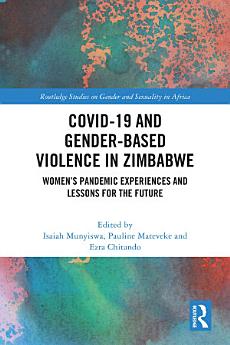COVID-19 and Gender-Based Violence in Zimbabwe: Women's Pandemic Experiences and Lessons for the Future
About this ebook
In 2020, COVID-19 caught the world by surprise, and often the socio-cultural factors impacting the treatment and care of those infected by the virus were not fully considered. In Zimbabwe, the socially constructed role of women as caregivers left them particularly vulnerable. Not only this, but COVID-19 lockdowns coincided with particularly high levels of sexual exploitation and gender-based violence, with women again comprising the majority of victims. Authors in this book analyse the pandemic experiences of women in Zimbabwe, both in the workplace or in the home, with the hope of fostering positive cultural change, and sensitising policy-makers to the need for legislation that protects women in moments of disasters.
The important lessons and discussion points raised by this book will be important to policymakers both within Zimbabwe and beyond, and to researchers working on gender, public health, philosophy, sociology, and politics in Africa.
About the author
Isaiah Munyiswa (PhD) is a Senior Lecturer in the Department of Philosophy at the National University of Lesotho. He teaches courses in Political Philosophy, Critical Thinking Skills and Textual Analysis. His research interests are in the capabilities approach to human development, citizenship studies, Economic Philosophy and the Philosophy of Well-being.
Pauline Mateveke (PhD) Is a Senior Lecturer in the Department of English and Media Studies at the University of Zimbabwe. She is an African literature and culture scholar whose research interests include, gender, sexuality, Popular Culture, political and social themes on Africa.
Ezra Chitando (PhD) is a Professor of Phenomenology of Religion in the Department of Philosophy, Religion and Ethics at the University of Zimbabwe. His broad research and publication interests include method and theory in the study of religion, as well as religion, health, gender, security, politics, development, climate change, and sexuality, among others.




